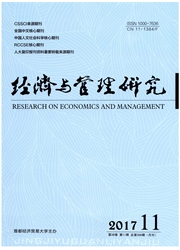
欢迎您!东篱公司
退出

 中文摘要:
中文摘要:
本文借鉴"制度—结构—行为—绩效"(ISCP)分析范式分析电力市场竞争格局,并研究电力竞争政策的运行机制。同时,运用福利经济学工具,从电力竞争政策制定及施行的角度评估其对消费者剩余的直接影响。结果表明,2003—2014年,电力竞争政策总体上使消费者剩余增加。
 英文摘要:
英文摘要:
Based on the ISCP analysis paradigm, this paper analyzes the competition pattern of electric power market and studies the operation mechanism of electric power competition policies. Using the welfare economics tool, this paper also analyses the direct impact on consumer surplus from the perspective of power competition policy formulation and implementation. The results show that from 2003 to 2014, the electricity competition policy generally increased the consumer surplus.
 同期刊论文项目
同期刊论文项目
 同项目期刊论文
同项目期刊论文
 期刊信息
期刊信息
